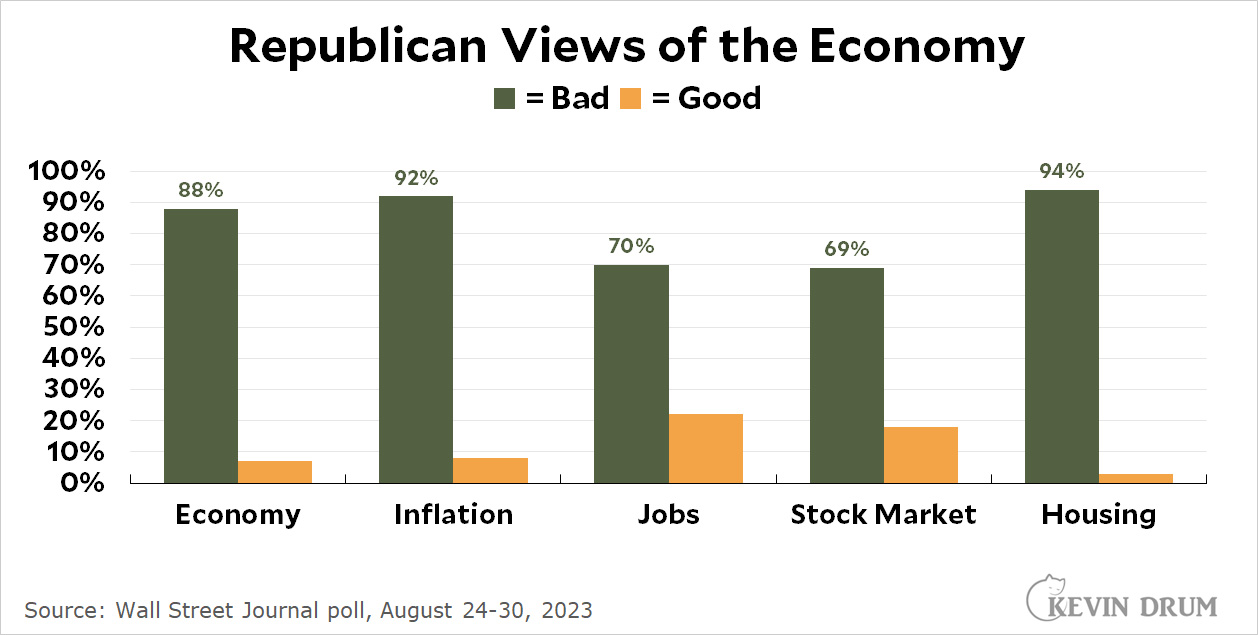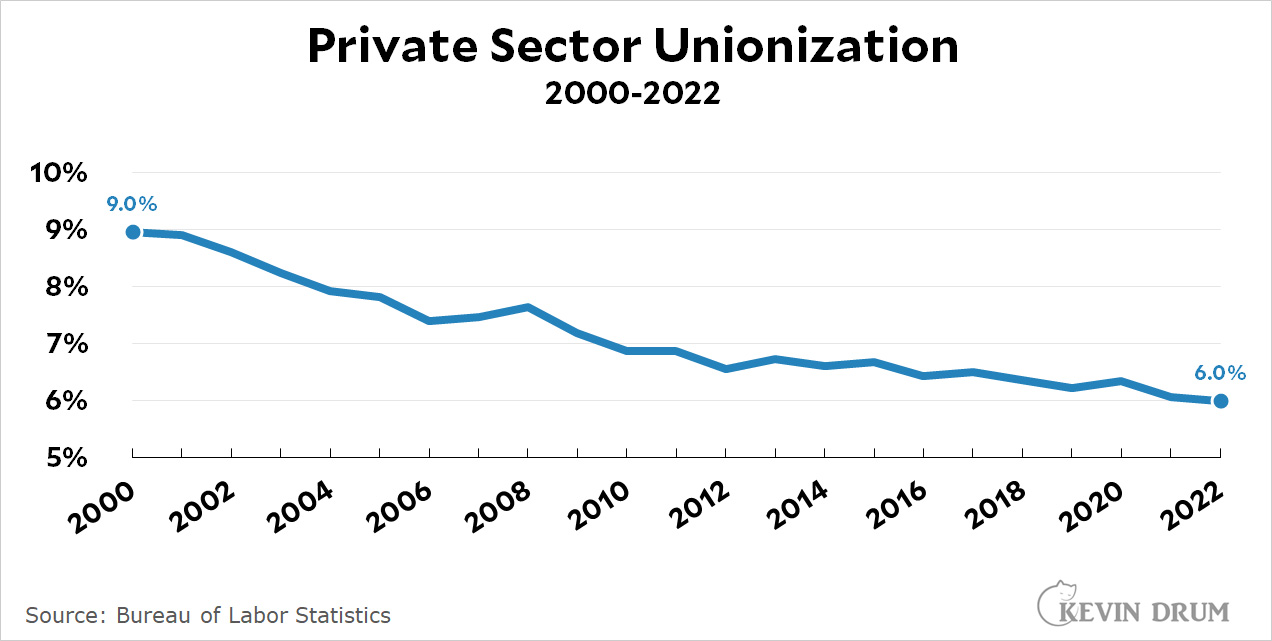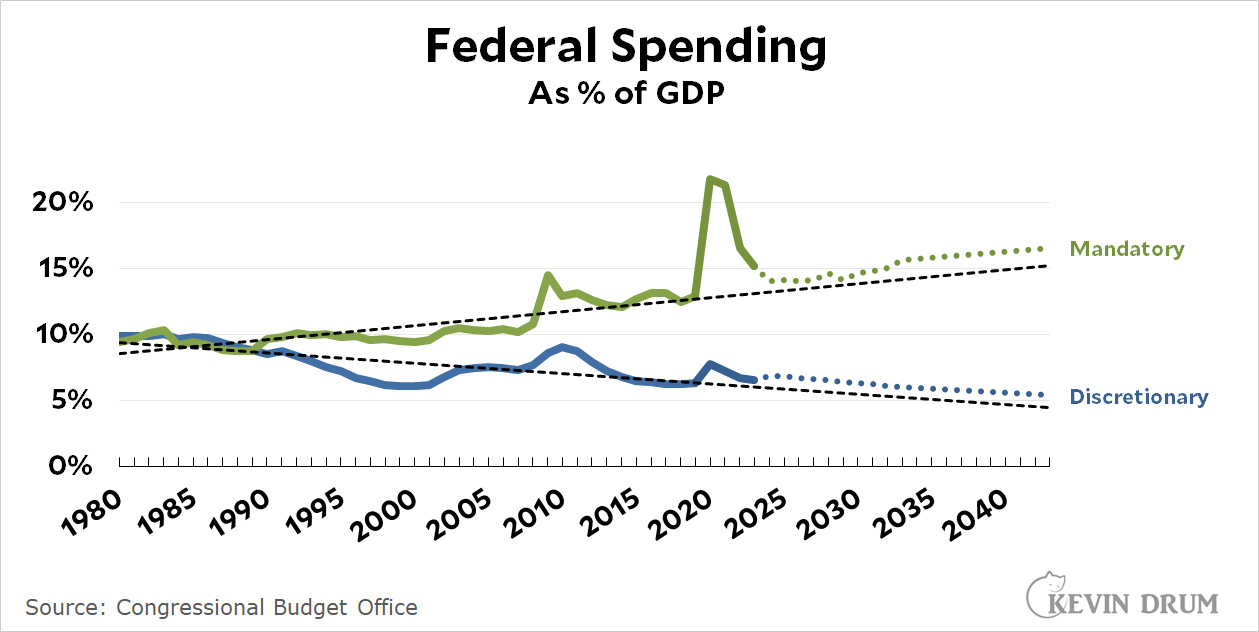This is the famous Capitol Records building on Vine Street in Los Angeles just north of Hollywood Boulevard.

Cats, charts, and politics

Jeff Stein in the Washington Post has an alarming story about the federal deficit that comes with this chart:
 I was all ready to lay into this because the numbers seemed wrong. The CBO's most recent estimates for the federal deficit were $1.4 trillion in 2022 and $1.5 trillion in 2023. That's an increase of $100 billion, only a little bit more than inflation.
I was all ready to lay into this because the numbers seemed wrong. The CBO's most recent estimates for the federal deficit were $1.4 trillion in 2022 and $1.5 trillion in 2023. That's an increase of $100 billion, only a little bit more than inflation.
But Stein is right and I was wrong. There are two things that caused this:
Bottom line: The deficit in 2022 was $430 billion lower than the original CBO estimate while the deficit in 2023 is now projected to be $400 billion higher. This nets out to an annual increase of nearly $1 trillion rather than $100 billion—and this in turn produces an approximate doubling from 2022 to 2023. That said, if you extend the chart with projections for future years it looks a little less alarming:
 2022 and 2023 are both outliers, and if the CBO's projections are correct the deficit has been steadily increasing since 2017 and will stabilize around 6% of GDP. That's very high, but perhaps not quite as alarming as a doubling from 2022 to 2023 would imply.
2022 and 2023 are both outliers, and if the CBO's projections are correct the deficit has been steadily increasing since 2017 and will stabilize around 6% of GDP. That's very high, but perhaps not quite as alarming as a doubling from 2022 to 2023 would imply.
POSTSCRIPT: The lower spending figure for 2022 means that spending increased about 5.4% in 2023 after adjusting for inflation. That's considerably more than the -2.0% decline you get just by looking at the official numbers (which include the fictional student loan costs).
The Wall Street Journal asked Republican voters what they thought of the economy over the past year:
 Here's the actual data for the past 12 months:
Here's the actual data for the past 12 months:
In fairness, I'd probably agree that things were getting worse if I spent all day marinating in Fox News, Donald Trump, right-wing Twitter, talk radio, and the Wall Street Journal editorial page.
E.J. Dionne says labor is cool again:
Young Americans are the country’s most pro-union generation. Labor has poll ratings most politicians only dream about, and the Biden administration is making workers’ pay, benefits and rights its calling card.
....Heralds of change include well-publicized organizing efforts in new sectors of the economy, broad public sympathy for the Hollywood writers’ struggle, and big wage gains by workers increasingly willing to strike for them. There is also President Biden, the most outspokenly pro-labor president since Franklin D. Roosevelt and Harry S. Truman.
Hmmm. I would like to be equally optimistic, and it's certainly true that President Biden has made labor central to his presidency in a way other Democratic presidents haven't. Unfortunately, the last few years haven't been great ones for unions.
Private sector unionization continues to fall, declining to 6% in 2022. And although union members generally earn more than nonunion workers (about $1,150 per week compared to $1,000 per week), their wage gains have fallen behind:

 Since 2012, union members have seen real wage gains of only 1.4% compared to 5% for nonunion workers. As much as I wish it were otherwise, this is not a sign of strong union health.
Since 2012, union members have seen real wage gains of only 1.4% compared to 5% for nonunion workers. As much as I wish it were otherwise, this is not a sign of strong union health.
You've probably heard that wages have lately been going up faster for the poor than for the affluent. It's true:
 Don't make too much of this, however. As you can see, nearly everyone is within about 1% of their pre-pandemic wages. The only exception is the very poorest, who are up 6%. But it's worth keeping in mind that this amounts to an increase of $32 per week over four years. It's better than nothing, but hardly enough to get excited about.
Don't make too much of this, however. As you can see, nearly everyone is within about 1% of their pre-pandemic wages. The only exception is the very poorest, who are up 6%. But it's worth keeping in mind that this amounts to an increase of $32 per week over four years. It's better than nothing, but hardly enough to get excited about.
Over at National Review the question of the day is whether President Biden will be impeached:
Rich Lowry: So let’s go to you, Phil Klein. Give us percentage odds Republicans will impeach Joe Biden one way or the other.
Phil Klein: I’d say about 70 percent that they’ll impeach him.
Charlie Cooke: I think it is slightly lower, maybe 60–40.
Michael Brendan Dougherty: 65 percent.
Lowry: Yeah, I think we’re all circling the same area. I might say 60 or 65.
Shazam! But why will he be impeached? The NR folks seem less interested in that, but a little earlier Cooke took a stab at it and the answer is.......surprise! It's all about Hunter Biden and his miasma of sleaziness:
I would just ask the question that I've asked before: Why? Why do we have a network of shell companies moving millions of dollars between them, with the president or his family as the ultimate destination? Why do we have pseudonymous email accounts exchanging emails with Joe Biden's son and his foreign business partners? What is the possible innocent explanation for that? I'm genuinely open to it. But I can't see one.
Cooke says he is genuinely open to innocent explanations, so here goes:
So that's it. Innocent explanations all around.
¹The call was about a Ukrainian pilot being held in Russia. It had nothing to do with Burisma or anything else related to Hunter.
Bridgette Exman, an assistant superintendent in Mason City, Iowa, describes how she tried to comply with her state's new law banning books in schoolrooms that contain “descriptions or visual depictions of a sex act”:
We created a list from several lists of commonly challenged books, then deleted from our list any book challenged for reasons other than sexual content. We then further winnowed our list to books in our school library collections.
That’s when we turned to ChatGPT for help. For each of these titles, we asked: Does the book contain a description of a sex act? ChatGPT identified 19 books, though for each, its response contained a caveat: “Yes, but,” noting a scene’s literary value or contextual appropriateness.
That sounds very clever to me! Oddly, not everyone thought so, even though Exman and her fellow humans read through all the books flagged by ChatGPT to make sure they really did contain sex acts.
In other words, it's not as if AI was busily censoring books here. It was the Iowa legislature that did it, and Exman was legally required to comply. Given that, what's wrong with a bit of labor-saving help for an onerous job she never wanted to do in the first place?
Needless to say, people were also upset about the particular books that were removed. One of them was Toni Morrison's Beloved, undoubtedly for this passage:
All forty-six men woke to rifle shot....When all forty-six were standing in a line in the trench, another rifle shot signaled the climb out and up to the ground above, where one thousand feet of the best hand-forged chain in Georgia stretched. Each man bent and waited.
....Kneeling in the mist they waited for the whim of a guard, or two, or three. Or maybe all of them wanted it. Wanted it from one prisoner in particular or none—or all.
"Breakfast? Want some breakfast, nigger?"
"Yes, sir."
"Hungry, nigger?"
"Yes, sir."
"Here you go."
Occasionally a kneeling man chose gunshot in his head as the price, maybe, of taking a bit of foreskin with him to Jesus.
Is this appropriate for school kids? That's a matter of opinion. Personally I think it's fine. But then, we could buy subscriptions to Hustler for every five-year-old in America and I'd be OK with it. Obviously my opinion is not a widely held one. But regardless of how you feel about it, how bad is it that in a gray area like this Iowa has one opinion while, say, California has a different one?
I suppose this makes me a bad liberal, but I can't get too worked up about all this. It's not as if Beloved is banned from the entire state of Iowa, after all. It's just considered inappropriate for Iowa school libraries. Maybe that's out of touch with modern mores, but it's hardly the end of civilization.
I happened to come across some whinging about federal spending earlier this morning and it prompted me to draw this chart:
 This is all the spending we have control over. Mandatory spending is mostly Social Security and Medicare but contains a chunk of other stuff too. Discretionary spending is defense and domestic spending that's appropriated on a yearly basis.
This is all the spending we have control over. Mandatory spending is mostly Social Security and Medicare but contains a chunk of other stuff too. Discretionary spending is defense and domestic spending that's appropriated on a yearly basis.
Between 2019 and 2043, CBO projects that discretionary spending will decrease by 0.9% and mandatory spending will increase by 3.6%. That's a total increase of 2.7% of GDP.
This is nothing new. Despite all the kvetching from Freedom Caucus Republicans over discretionary spending, it's been going steadily down since 1980 and will keep going down. That's not a problem. Mandatory spending, by contrast, has been going up, but we've known all along that it will keep going up. Social Security will keep increasing as baby boomers retire, peaking in 2034 and then staying steady after that. Medicare will keep increasing through around 2050, partly because of baby boomer retirement and partly because medical costs grow faster than inflation.
In any case, this has been in the cards forever and there's nothing much to be done about it. Discretionary spending is already declining and both Social Security and Medicare are wildly popular—and in a democracy that means there's little chance of cutting them back. So if we want to stabilize deficits it means increasing taxes by about 2.7% of GDP—or maybe a little more if you want to reduce deficits. That's not really very much, and of course it would stabilize projected interest expenses too.
That's all it would cost us to fix our budgetary problems more or less forever. It's too bad Republicans refuse to allow it.
This is completely ridiculous:
More than a year after Roe v. Wade was overturned, many conservatives have grown frustrated by the number of people able to circumvent antiabortion laws — with some advocates grasping for even stricter measures they hope will fully eradicate abortion nationwide.
That frustration is driving a new strategy in heavily conservative cities and counties across Texas. Designed by the architects of the state’s “heartbeat” ban that took effect months before Roe fell...[new ordinances] make it illegal to transport anyone to get an abortion on roads within the city or county limits. The laws allow any private citizen to sue a person or organization they suspect of violating the ordinance.
Roulette and craps are illegal in California, but it's not illegal to drive someone to Las Vegas to play. Why, we even allow Las Vegas to advertise here in order to lure people into activities that are illegal in California.
This is universal in a country where freedom of movement is guaranteed and the Constitution says "Full Faith and Credit shall be given in each State to the public Acts, Records, and judicial Proceedings of every other State." Texas may not like the fact that abortion is legal in California, but that's tough. The Supreme Court says every state can decide for itself, and the Constitution says other states have to respect that. But there's a problem:
While these restrictions appear to violate the U.S. Constitution — which protects a person’s right to travel — they are extremely difficult to challenge in court, said Mary Ziegler, a law professor at the University of California at Davis who focuses on abortion. Because the laws can be enforced by any private citizen, abortion rights groups have no clear government official to sue in a case seeking to block the law.
This needs to go to court right quick anyway. Someone has standing and someone can be sued, even if no one has yet tried to enforce the law. I know that deputizing private citizens for enforcement is the latest hotness from too-clever-by-half Republicans, but I don't think even crackpot judges like Matthew Kacsmaryk or James Ho would have the balls to uphold statutes like this. Texas abortion fanatics may want to "build a wall" against "abortion traffickers," but they can't. End of story.